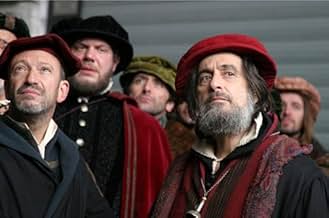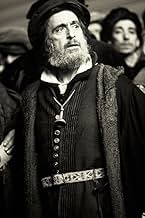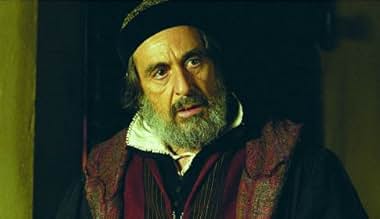En la Venecia del siglo XVI, cuando un comerciante no puede devolver un gran préstamo de un judío a un amigo con ambiciones románticas, el acreedor, amargamente vengativo, exige un pago horr... Leer todoEn la Venecia del siglo XVI, cuando un comerciante no puede devolver un gran préstamo de un judío a un amigo con ambiciones románticas, el acreedor, amargamente vengativo, exige un pago horrible en su lugar.En la Venecia del siglo XVI, cuando un comerciante no puede devolver un gran préstamo de un judío a un amigo con ambiciones románticas, el acreedor, amargamente vengativo, exige un pago horrible en su lugar.
- Dirección
- Guionistas
- Elenco
- Nominada a1 premio BAFTA
- 2 premios ganados y 7 nominaciones en total
- Aragon
- (as Antonio Gil-Martinez)
- Dirección
- Guionistas
- Todo el elenco y el equipo
- Producción, taquilla y más en IMDbPro
Opiniones destacadas
But Radford makes these scenes much weaker than necessary. For example, he allows the suitors to overact laughably and also cuts their dialog in a way that limits their complexity -- especially with the Duke, who appears stuck-up but smart in the full text, merely stupidly foppish in the movie. In short, Radford wipes out any hope for either comedy or pathos -- both of which can be found in better productions.
In contrast to the cheesy heterosexuality, the clearly homosexual love of Antonio for Bassanio is quite moving, in large part because it's subtly played by an excellent Jeremy Irons. For that matter, Lynn Collins is much better at portraying Portia in drag than Portia the beautiful, expectant young maiden.
Meanwhile, the Shylock plot is compelling as always and benefits from an excellent performance by Pacino. However, a whole strand of Shylock's character has been more or less eliminated. In the full text, Shylock repeatedly makes it clear that he does *not* merely want revenge for mistreatment -- rather he wants to kill Antonio because Antonio is cutting into his business and bringing down interest rates by lending for free:
"I hate him for he is a Christian; but more for that in low simplicity he lends out money gratis, and brings down the rate of usance here with us in Venice."
That's also why Shylock refuses Bassanio's offer of many times more than Antonio owes -- Shylock knows that it still won't equal what he can make in higher interest if Antonio is dead:
"I will have the heart of him, if he forfeit; for, were he out of Venice, I can make what merchandise I will."
To make Shylock more sympathetic, such cold-hearted calculation is excised almost entirely from this screen version.
Still, by making Shylock less an outright villain, the director arguably improves on the original -- Pacino can appear more intriguingly human, less like the Jewish Snidely Whiplash that Shakespeare frequently gives us.
In all, I felt that about two-thirds of this Merchant was excellent drama, and one third was tedious romantic "comedy."
The text is quite stripped down with many passages cut. But, I only noticed one line which was cut at the moment when I expected to hear it - and it was replaced by a look that said it all. This economy and judicious editing has given us a gripping movie - not just a film of the play.
And at last, there is a rationale as to why Antonio is so loyal and generous to the undeserving/unrelated Bassanio - you can almost feel Antonio's pulse start to race when he catches glimpse of Bassanio passing by in a gondola, or arriving for a visit. But it is as subtle as that - no more. I was spellbound.
There were many other highlights. I felt the arguments during the trial to be heartbreaking. And, the suitors' trials are hilarious.
Add all that to glorious cinematography and costumes that resonated with the times, and you'll understand why I can't wait to see it again. And again.
The reason for this neglect of the play may be connected with sensitivities about the play's alleged anti-Semitism, a subject which has been even more sensitive since the rise to power of the Nazis in 1933. (This may explain why all previous versions were made during the silent era; in 1908 or 1922 it would have been easier to portray Shylock as a straightforward villain than it would be today). Yet in my view the film is not anti-Semitic at all. It should be remembered that during Shakespeare's lifetime there was no settled Jewish community in England; the Jews had been expelled by Edward I in the late 13th century, and were not permitted to return until the time of Cromwell, some forty years after Shakespeare's death. As far as we know, Shakespeare never travelled abroad, so it seems quite possible that he himself never knew any Jews personally or experienced the effects of anti-Semitism at first hand. The play is not simply about the Jewish question, but is, among other things, an analysis of the corrosive effects of religious prejudice. It may, in fact, be a coded examination of the mutual antipathy between Catholics and Protestants in Tudor England (something of which Shakespeare certainly would have had first-hand experience) and an appeal for greater tolerance between them.
Then as now, traditional anti-Semitic stereotypes had always depicted Jews as avaricious, but Shylock's principal sin is not avarice; if it were, he would certainly have accepted Bassanio's offer to pay him six thousand ducats, twice the amount borrowed by Antonio. Rather, Shylock's besetting sin is anger, and the root of his anger is the way in which he and his fellow-Jews are treated by the Christians of Venice. Not only are Jews in general regarded as second-class citizens, but Jewish moneylenders such as Shylock are particular targets for abuse, even though the services they provide are necessary to the Venetian economy. The play shows the corrupting effects of prejudice. Not only do views of this sort corrupt the Christians who hold them, they can also corrupt the Jews who suffer abuse. Shylock's vindictiveness is out of all proportion to the wrongs he has suffered. By spitting on him and calling him a dog, Antonio behaves like a boorish bigot, but boorishness and bigotry are not generally regarded as crimes deserving of the death penalty. Moreover, Shylock seeks to revenge himself on Antonio not merely for the undoubted wrongs that Antonio has done towards him, but also for all the wrongs, real and imaginary, that he has suffered at the hands of the Christian community, such as his daughter's marriage to Lorenzo.
It is to the credit of the film's director, Michael Radford and of its star, Al Pacino, that they understand all these issues. Pacino's Shylock has, initially, a sort of angry dignity about him that gradually gives way to vindictive rage and finally, after his humiliation in the trial scene by Portia's reasoning, to pathos. We see clearly that he has been the instrument of his own destruction, but we can still sympathise with him. In my view, none of Pacino's performances that I have seen have ever equalled those he gave in the first two 'Godfather' films (not 'Scent of a Woman', for which he won an Oscar, and certainly not 'Godfather III'), but 'The Merchant of Venice is the one that comes closest to those benchmarks. The other acting performance that stood out was Lynn Collins's luminous Portia, speaking her lines with great clarity and simplicity and bringing out the intelligence and resourcefulness that make her character more than simply a romantic heroine. I was less impressed with Jeremy Irons's Antonio, who seemed too passive. Antonio is a complex character; part loyal friend, part melancholy contemplative, part religious bigot and part enterprising capitalist. Although Irons captured the first two of those aspects, it was difficult to envisage his Antonio either spitting on someone of a different faith or hazarding his all on risky trading ventures.
Radford's interpretation of the play was attacked by the film critic of the 'Daily Telegraph' who, although he admired Pacino's performance, disliked the period setting and argued that Shakespeare needs to be placed in a contemporary setting if it is to have 'relevance' for a modern audience, citing a recent stage production which set the action in Weimar Germany. I would disagree profoundly with this approach. The theatre and the cinema are quite different media and, while there have been some striking modernist approaches to Shakespeare in the cinema (Trevor Nunn's 'Twelfth Night' comes to mind), a traditionalist approach is often the best one. (I preferred, for example, Zeffirelli's 'Romeo and Juliet' to Baz Luhrmann's). The idea that we can only appreciate Shakespeare in a modern guise is sheer intellectual laziness; we are not prepared to make the effort to see our greatest writer in the context of the Elizabethan society that produced him, but rather prefer him dressed up as an ersatz twentieth-century man.
Radford's traditional approach not only enables us to appreciate that bigotry and vindictiveness are age-old, universal problems, but also makes for a visually striking film. In the play, the scenes set in Venice itself are characterised by turbulent action; those set in Portia's country house at Belmont are happier and more peaceful. In the film, the Venetian exterior scenes were shot on location against a backdrop of misty, wintry grey skies, similar to the look achieved in 'Don't Look Now'. The candlelit interiors, with faces brightly lit against a dark background, were reminiscent of the chiaroscuro effects of a Caravaggio painting; I suspect this was quite deliberate, as Caravaggio was a contemporary of Shakespeare. By contrast to dark or misty Venice, the Belmont scenes (shot in an enchanting Palladian villa on an island in a lake) were characterised by sunshine or peaceful moonlight.
This is one of the best Shakespeare adaptations of recent years; an intelligent and visually attractive look at a complex play. 8/10.
A couple of errors. We see a black swan on the water in front of Portia's house. These birds are natives of Australia and were not introduced to Europe until well after 1596, the date when the film is set. Also, the portrait of Portia in the leaden casket is painted in the style of the Florentine Botticelli, who was active about a century before that date. Lynn Collins may be reminiscent of a Botticelli beauty, but it seems unlikely that a late 16th century Venetian lady would have had herself painted in the manner of late 15th century Florence.
Like so many of Shakespeare's great tragic heroes, Shylock continues to fascinate after 400 years because he is such a difficult and complex character. Pitiful, proud, angry, vengeful, weak, arrogant; his behaviour defies simply analysis and continues to be argued over. He is flawed not because he is a Jew, but because he is human. Rarely do modern screenwriters imbue their creations with such richly textured contradictions, and it is to everyone's benefit that we have Shakespeare to draw on for inspiration.
Shakespearean language is wild and rambling, saturated in multiple meanings, word play and metaphor. To be understood it must be wrangled and tamed by an actor with the strength and knowledge to do so. When an actor fails, the words pour forth in a torrent of incomprehensible words, but when he succeeds, the English language springs to life with an immediacy and vibrancy that takes your breath away. Al Pacino is one such actor, and here displays an incredible level of clarity and control that, were there any justice, would sweep every award in the offering. He meets the challenge of presenting Shylock head on, and delivers an extraordinarily subtle and nuanced performance. It would be a crime if we never got the opportunity to see what he does with King Lear.
The supporting cast is noteworthy. Jeremy Irons gives an original take on the familiar Antonio, presenting an older, quieter figure that displays the unsavoury contradictions between medieval chivalry and ugly prejudice of the time. Joseph Fiennes is a revelation as he matures beyond superficial eye-candy to actually inhabit a character for once. Lynn Collins is the only disappointment. Many of Shakespeare's women are underwritten and require an actor to really work hard to bring them to life, and Collins' Gwyneth Paltrow impersonation seems a little flat and unsuited to the darker tone that Radford is aiming for.
The design team must be acknowledged for creating a unique and thoroughly believable vision of Late Renaissance Venice. The city has not looked this ominous since 'Don't Look Now'. Taking full advantage of extant locations and natural light, the film has an appearance of authenticity that is greatly enhanced by the dark and timeworn costume design. All, again, are worthy of award recognition.
The financial backers of films such as this must be commended. With a budget of $30 million, they must go into such a venture in the full and certain knowledge that they will never make a profit, and yet they invest nonetheless. We can all be grateful for it, as the result is a remarkable adaptation that is sure to be a benchmark for many years to come.
The acting was simply superb. Al Pacino was (as ALWAYS) perfect. He captured the torture of emotions that run through Shylock impeccably and easily stole the spotlight whenever he was on screen. Jeremy Irons paved the way for great British acting in his earlier times, and now has done the same. Also Lynn Collins, a fairly recent newcomer was perfect as Portia. She was stunning to look at and managed to pull of the speeches with grace.
Although i have all this praise, the film was definitely over-long and many scenes seemed to me like they could have done with a few edits or too. However, the atmosphere of Venice was amazing and it truly felt real in all the mannerisms of the actors.
Ultimately a very successful and ambitious film, that leaves nothing to the imagination, as it is a very realistic approach to Shakespeare. Beautiful to look at and incredible actors too (especially for Pacino) make this a great film that i would watch again an recommend at the drop of a Venetian hat.
¿Sabías que…?
- TriviaThe bare-breasted prostitutes were not put in the film to make it more risqué, but rather to add a note of historical authenticity. Venetian law at the time required all prostitutes to bare their breasts because the Christian authorities were concerned about rampant homosexuality in their city.
- ErroresIn Venice in 1598 a woman with no head-dress and her hair flowing loose would be taken for a whore, yet this is how Portia frequently appears.
- Citas
Shylock: I am a Jew! Hath not a Jew eyes? hath not a Jew hands, organs, dimensions, senses, affections, passions? Fed with the same food, hurt with the same weapons, subject to the same diseases, healed by the same means, warmed and cooled by the same winter and summer, as a Christian is? If you prick us, do we not bleed? if you tickle us, do we not laugh? if you poison us, do we not die? And if you wrong us, shall we not revenge? If we are like you in the rest, we will resemble you in that. If a Jew wrong a Christian, what is his humility? Revenge. If a Christian wrong a Jew, what should his sufferance be - by Christian example? Why, revenge. The villany you teach me, I will execute, and it shall go hard - but I will better the instruction.
- Créditos curiososPROLOGUE: "Intolerance of the Jews was a fact of 16th century life even in Venice, the most powerful and liberal city state in Europe."
"By law the Jews were forced to live in the old walled foundry or 'Geto' area of the city. After sundown the gate was locked and guarded by Christians."
"In the daytime any man leaving the ghetto had to wear a red hat to mark him as a Jew."
"The Jews were forbidden to own property. Thus, they practiced usury, the practice of lending money at interest. This was against Christian law."
"The sophisticated Venetians would turn a blind eye to it but for the religious fanatics, who hated the Jews, it was another matter . . . "
- ConexionesFeatured in 'Merchant of Venice': Shakespeare Through the Lens (2005)
- Bandas sonorasWith Wand'ring Steps
Composed by Jocelyn Pook, Lyrics by John Milton
Arranged by Jocelyn Pook
Performed by Baroque Strings Quartet Ensemble, featuring solo vocals by Andreas Scholl
Harp: Siobhan Armstrong
Psaltery: Harvey Brough
Lute: Elizabeth Kenny
Published by Shylock Ltd / EMI Music Publishing Ltd
© 2004 Decca Music Group Limited
(p) Jocelyn Pook Ltd. /2004 Decca Music Group Limited
Selecciones populares
Detalles
- Fecha de lanzamiento
- Países de origen
- Sitios oficiales
- Idiomas
- También se conoce como
- The Merchant of Venice
- Locaciones de filmación
- Esch-sur-Alzette, Luxembourg(only Venice film set)
- Productoras
- Ver más créditos de la compañía en IMDbPro
Taquilla
- Presupuesto
- USD 30,000,000 (estimado)
- Total en EE. UU. y Canadá
- USD 3,765,585
- Fin de semana de estreno en EE. UU. y Canadá
- USD 69,868
- 2 ene 2005
- Total a nivel mundial
- USD 21,560,182
- Tiempo de ejecución2 horas 11 minutos
- Color
- Mezcla de sonido
- Relación de aspecto
- 2.35 : 1
Contribuir a esta página











































